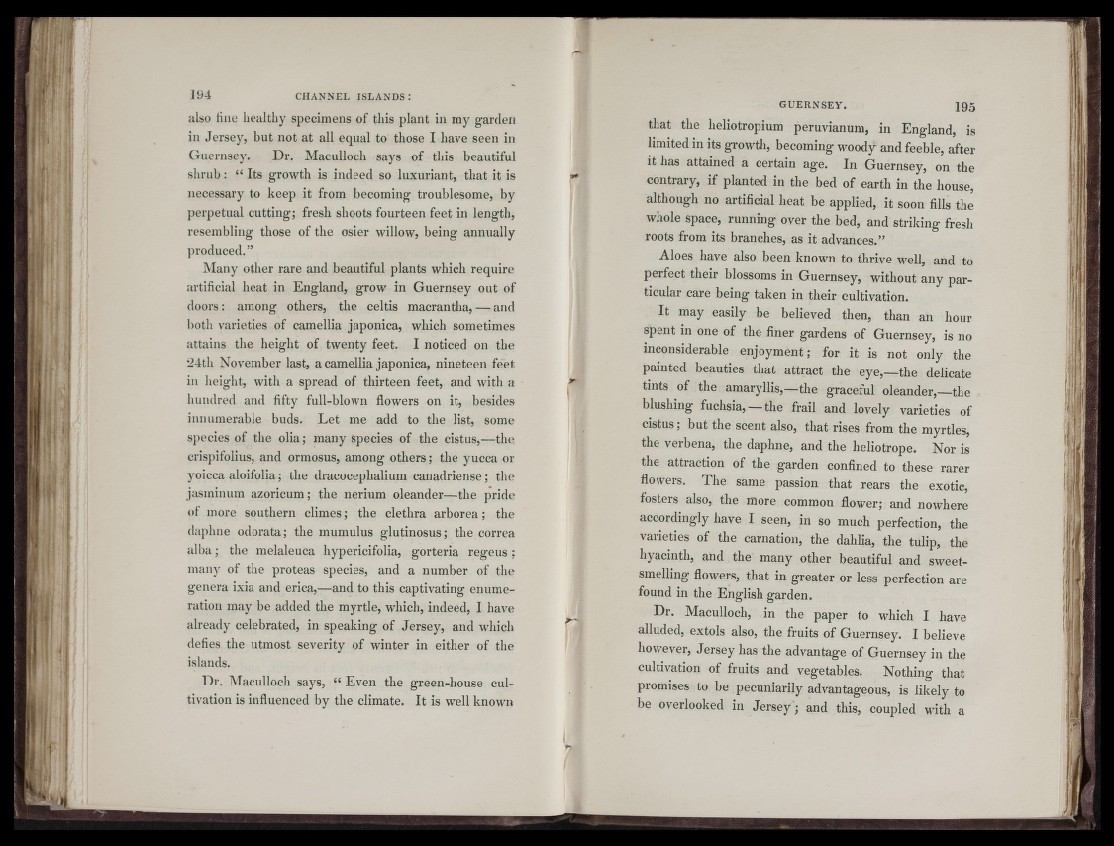
t;
\
'fi
also fine healthy specimens of this plant in my garden
in Jersey, but not at all equal to those I have seen in
Guernsey. Dr. Maculloch says of this beautiful
shrub: “ Its growth is indeed so luxuriant, that it is
necessary to keep it from becoming troublesome, by
perpetual cutting; fresh shoots fourteen feet in length,
resembling those of the osier willow, being annually
produced.”
Many other rare and beautiful plants which require
artificial heat in England, grow in Guernsey out of
doors: among others, the celtis macrantha, — and
both varieties of camellia japónica, which sometimes
attains the height of twenty feet. I noticed on the
24th November last, a camellia japónica, nineteen feet
iu lieight, with a spread of thirteen feet, and with a
hundred and fifty full-blown flowers on it, besides
innumerable buds. Let me add to the list, some
species of the olia; many species of the cistus,—the
crispifoiius, and ormosus, among others; the yucca or
yoicca aloifolia; the dracocephalium canadriense; the
jasininum azoricum; the neriiim oleander—the pride
of more southern climes; the clethra arbórea; the
daphne odorata; the rnumulus glutinosas; the correa
a lb a; the melaleuca bypericifolia, gorteria rege us ;
many of the proteas species, and a number of the
genera ixia and erica,—and to this captivating enumeration
may be added the myrtle, wdiich, indeed, I have
already celebrated, in speaking of Jersey, and which
defies the utmost severity of winter in either of the
islands.
Dr. Maculloch says, “ Even the green-house cultivation
is influenced by the climate. It is well known
that the heliotropium peruvianum, in England, is
limited in its growth, becoming woody and feeble, after
it has attained a certain age. In Guernsey, on the
contrary, if planted in the bed of earth in the house,
although no artificial heat be applied, it soon fills the
whole space, running over the bed, and striking fresh
roots from its branches, as it advances.”
Aloes have also been known to thrive well, and to
perfect their blossoms in Guernsey, without any particular
care being taken in their cultivation.
It may easily be believed then, than an hour
spent in one of the finer gardens of Guernsey, is no
inconsiderable enjoyment; for it is not only the
painted beauties that attract the eye,—the delicate
tints of the amaryllis,—the graceful oleander,—the
blushing fuchsia, — the frail and lovely varieties of
cistus; but the scent also, that rises from the myrtles,
the verbena, the daphne, and the heliotrope. Nor is
the attraction of the garden confined to these rarer
flowers. The same passion that rears the exotic,
fosters also, the more common flower; and nowhere
accordingly have I seen, in so much perfection, the
varieties of the carnation, the dahlia, the tulip, the
hyacinth, and the many other beautiful and sweetsmelling
flowers, that in greater or less perfection are
found in the English garden.
Dr. Maculloch, in the paper to which I have
alluded, extols also, the fruits of Guernsey. I believe
however, Jersey has the advantage of Guernsey in the
cultivation of fruits and vegetables. Nothing that
promises to be pecuniarily advantageous, is likely to
be overlooked in Je rsey ; and this, coupled with a
A
:í:i